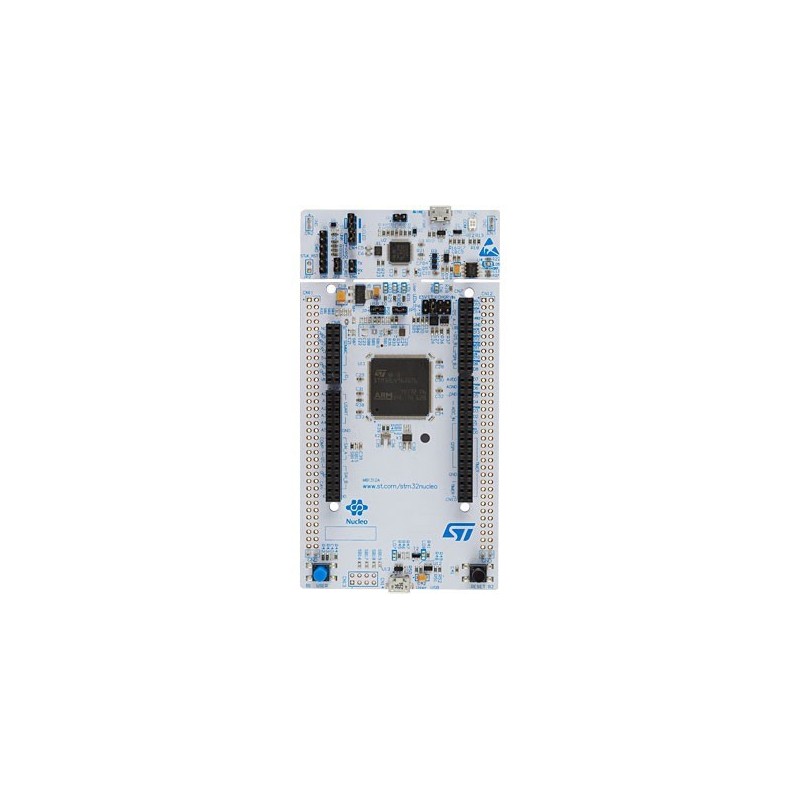




zł88.94 tax excl.
The STM32 Nucleo-144 boards provide an affordable and flexible way for users to try out new concepts and build prototypes by choosing from the various combinations of performance and power consumption features, provided by the STM32 microcontroller
Description
The STM32 Nucleo-144 boards provide an affordable and flexible way for users to try out new concepts and build prototypes by choosing from the various combinations of performance and power consumption features, provided by the STM32 microcontroller. For the compatible boards, the SMPS significantly reduces power consumption in Run mode.
The ST Zio connector, which extends the Arduino™ Uno V3 connectivity, and the ST morpho headers provide an easy means of expanding the functionality of the Nucleo open development platform with a wide choice of specialized shields.
The STM32 Nucleo-144 board does not require any separate probe as it integrates the ST-LINK/V2-1 debugger/programmer.
The STM32 Nucleo-144 board comes with the STM32 comprehensive free software libraries and examples available with the STM32Cube MCU Package.
Features
Data sheet
Manufacturer BTC Korporacja sp. z o. o. Lwowska 5 05-120 Legionowo Poland sprzedaz@kamami.pl 22 767 36 20
Responsible person BTC Korporacja sp. z o. o. Lwowska 5 05-120 Legionowo Poland sprzedaz@kamami.pl 22 767 36 20
Easy-to-use retractable cable with USB type A plugs and mini-B type, the cable is 73 cm long after being unrolled
Expansion board with a dynamic NFC/RFID tag based on the M24SR64-Y. The system is equipped with EEPROM memory, the module can be powered by the Arduino connector. STMicroelectronics X-NUCLEO-NFC01A1
STM32 Nucleo-144 development board with STM32F303ZE MCU, supports Arduino, ST Zio and morpho connectivity
STM32 Nucleo-144 development board with STM32F412ZG MCU, supports Arduino, ST Zio and morpho connectivity
STM32 Nucleo-144 development board with STM32F767ZI MCU, supports Arduino, ST Zio and morpho connectivity
No product available!
STM32 Nucleo-144 development board with STM32F412ZG MCU, supports Arduino, ST Zio and morpho connectivity
The STM32 Nucleo-144 boards provide an affordable and flexible way for users to try out new concepts and build prototypes by choosing from the various combinations of performance and power consumption features, provided by the STM32 microcontroller
STM32 Nucleo-144 development board with STM32F722ZE MCU, supports Arduino, ST Zio and morpho connectivity
The STM32 Nucleo-144 boards provide an affordable and flexible way for users to try out new concepts and build prototypes by choosing from the various combinations of performance and power consumption features, provided by the STM32 microcontroller. For the compatible boards, the SMPS significantly reduces power consumption in Run mode.
The STM32 Nucleo-144 boards provide an affordable and flexible way for users to try out new concepts and build prototypes by choosing from the various combinations of performance and power consumption features, provided by the STM32 microcontroller
The STM32 Nucleo-144 boards provide an affordable and flexible way for users to try out new concepts and build prototypes by choosing from the various combinations of performance and power consumption features, provided by the STM32 microcontroller
No product available!
Development board with ST Zio and ST morpho connectors, based on the STM32L4R5ZIT6 microcontroller from the STM32L4 + series. Thanks to the embedded programmer compatible with ST-Link/v2-1, it is possible to program and debug the microcontroller via USB. STMicroelectronics NUCLEO-L4R5ZI-P
Development board with ST Zio and ST morpho connectors, based on the STM32F756ZGT6 microcontroller. Thanks to the embedded programmer compatible with ST-Link/v2-1, it is possible to program and debug the microcontroller via USB. STMicroelectronics NUCLEO-F756ZG
Development board with ST Zio and ST morpho connectors, based on the STM32H755ZI microcontroller. Thanks to the embedded STLINK-V3 programmer, it is possible to program and debug the microcontroller via USB. STMicroelectronics NUCLEO-H755ZI-Q
Development board with ST Zio and ST morpho connectors, based on the STM32H753ZI microcontroller. Thanks to the embedded STLINK-V3 programmer, it is possible to program and debug the microcontroller via USB. STMicroelectronics NUCLEO-H753ZI
No product available!
STM32 Nucleo starter pack for LoRa technology. It consists of two development kits: NUCLEO-L073RZ and NUCLEO-F746ZG and expansion modules for communication within LoRa: LRWAN_NS1 and LRWAN_GS_LF1. STMicroelectronics P-NUCLEO-LRWAN3
No product available!
STM32 Nucleo-144 development board with STM32H7A3ZI MCU, supports Arduino, ST Zio and morpho connectivity. STMicroelectronics NUCLEO-H7A3ZI-Q
Evaluation kit from the STM32 Nucleo-144 series equipped with the STM32L4P5ZGT6U microcontroller in the LQFP144 package. A large number of pins allows you to create complex devices using the numerous peripherals available in the microcontroller. STMicroelectronics NUCLEO-L4P5ZG
Evaluation kit from the STM32 Nucleo-144 series equipped with the STM32L552ZE microcontroller in the LQFP144 enclosure. A large number of pins allows you to create complex devices using the numerous peripherals available in the microcontroller. STMicroelectronics NUCLEO-L552ZE-Q
Development board with ST Zio and ST morpho connectors, based on the STM32L552ZE microcontroller. Thanks to the built-in programmer compatible with ST-Link/v2-1, it is possible to program and debug the microcontroller via the USB connector. STMicroelectronics NUCLEO-L552ZE-P-Q

The STM32 Nucleo-144 boards provide an affordable and flexible way for users to try out new concepts and build prototypes by choosing from the various combinations of performance and power consumption features, provided by the STM32 microcontroller
